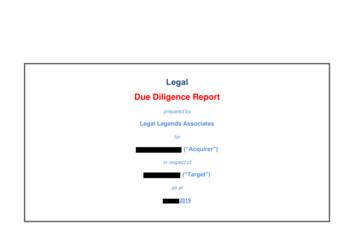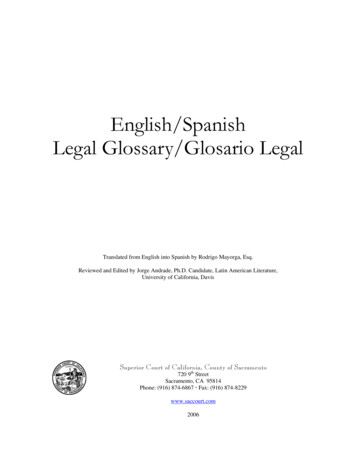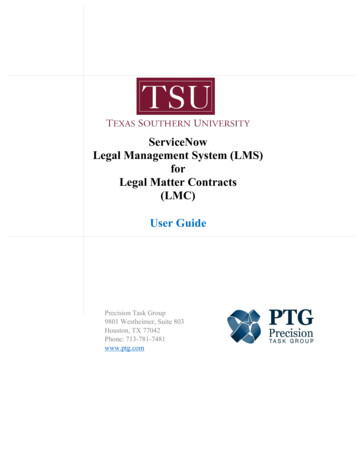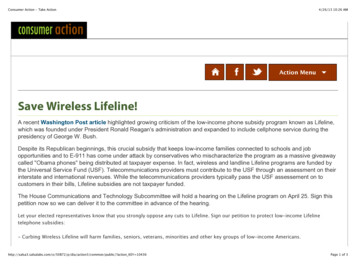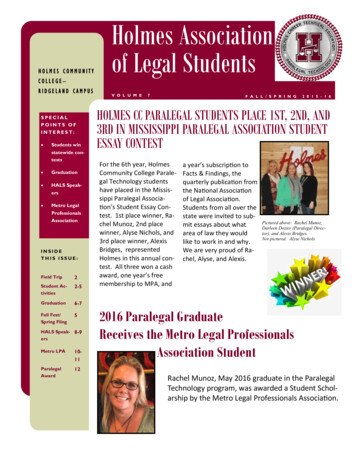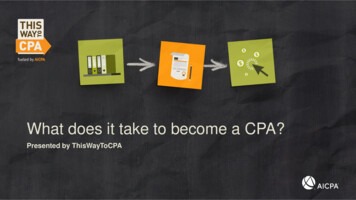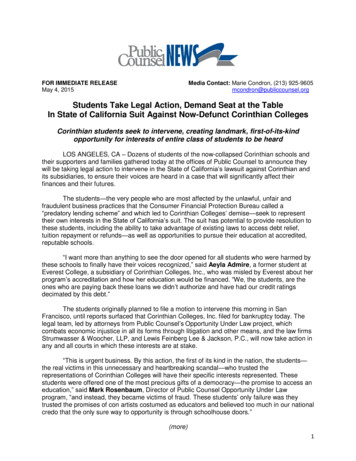
Transcription
FOR IMMEDIATE RELEASEMay 4, 2015Media Contact: Marie Condron, (213) 925-9605mcondron@publiccounsel.orgStudents Take Legal Action, Demand Seat at the TableIn State of California Suit Against Now-Defunct Corinthian CollegesCorinthian students seek to intervene, creating landmark, first-of-its-kindopportunity for interests of entire class of students to be heardLOS ANGELES, CA – Dozens of students of the now-collapsed Corinthian schools andtheir supporters and families gathered today at the offices of Public Counsel to announce theywill be taking legal action to intervene in the State of California’s lawsuit against Corinthian andits subsidiaries, to ensure their voices are heard in a case that will significantly affect theirfinances and their futures.The students—the very people who are most affected by the unlawful, unfair andfraudulent business practices that the Consumer Financial Protection Bureau called a“predatory lending scheme” and which led to Corinthian Colleges’ demise—seek to representtheir own interests in the State of California’s suit. The suit has potential to provide resolution tothese students, including the ability to take advantage of existing laws to access debt relief,tuition repayment or refunds—as well as opportunities to pursue their education at accredited,reputable schools.“I want more than anything to see the door opened for all students who were harmed bythese schools to finally have their voices recognized,” said Aeyla Admire, a former student atEverest College, a subsidiary of Corinthian Colleges, Inc., who was misled by Everest about herprogram’s accreditation and how her education would be financed. “We, the students, are theones who are paying back these loans we didn’t authorize and have had our credit ratingsdecimated by this debt.”The students originally planned to file a motion to intervene this morning in SanFrancisco, until reports surfaced that Corinthian Colleges, Inc. filed for bankruptcy today. Thelegal team, led by attorneys from Public Counsel’s Opportunity Under Law project, whichcombats economic injustice in all its forms through litigation and other means, and the law firmsStrumwasser & Woocher, LLP, and Lewis Feinberg Lee & Jackson, P.C., will now take action inany and all courts in which these interests are at stake.“This is urgent business. By this action, the first of its kind in the nation, the students—the real victims in this unnecessary and heartbreaking scandal—who trusted therepresentations of Corinthian Colleges will have their specific interests represented. Thesestudents were offered one of the most precious gifts of a democracy—the promise to access aneducation,” said Mark Rosenbaum, Director of Public Counsel Opportunity Under Lawprogram, “and instead, they became victims of fraud. These students’ only failure was theytrusted the promises of con artists costumed as educators and believed too much in our nationalcredo that the only sure way to opportunity is through schoolhouse doors.”(more)1
“No one is affected more by the misrepresentations of Corinthian than the formerstudents, who thought they were accessing a higher education in pursuit of the American dreamand instead became victims to a predatory lender,” said Fredric Woocher, Strumwasser &Woocher, LLP.Following are just a few examples of how Corinthian misled students:Jaclyn Dingess attended the Everest paralegal program from 2008-2011. When shesigned up for her first loan of 7,000, she was told that would be the cost for the entire program,but she later found out the school took out additional loans for her without informing her. Onseveral occasions, Everest employees took her out of class and asked her to complete whatthey called an online survey; she later discovered they were taking out additional loans withouther knowledge. She now owes over 40,000 in public and private loans. Read Jacyln’s story.Tiffany Contreras enrolled in Everest’s paralegal program in April 2013 and was nineweeks from graduating with Everest closed its doors on April 27, 2015. She currently owes over 47,000 in subsidized and unsubsidized federal loans, as well as a private Genesis loan. Theweek before the school closed, she was asked to pay a 500 “repack” fee and was told by anemployee of the financial aid office that the school had been “repackaging” students’ loanswithout their permission. Read Tiffany’s story.Sarah Dieffenbacher is a mother of four and the first person in her family to go tocollege. She studied at Everest College from 2007-2010 to become a legal assistant and wasshocked to learn from a potential employer that her program was not recognized, let alone ABAaccredited as Everest had assured her it was. She was also shocked to discover she now owes 110,000 in loans—loans that the school took out in her name without notifying her. ReadSarah’s story.Tasha Courtright had the highest grade point average at Everest College’s Ontariocampus, where she completed an associate’s degree in criminal justice and a bachelor’s inbusiness management. Everest recruiters aggressively pursued her, assuring her she would beearning 45,000 per year after completing her degree and claiming a 91% job placementsuccess rate in placing students, which turned out to be untrue. She told them she could notafford college, and they told her they “ran the numbers” and assured her that grants would coverthe cost of her program. She now owes 41,000 in debt and has never been able to obtaindocumentation of her loans. Read Tasha’s story.Aeyla Admire, who completed Everest College’s medical assistant training program in2006-2007 with straight A’s, is the first person in her family to go to college. She wanted toaccess a higher education so she could gain the financial security she never had growing up asthe child of a single mother working minimum-wage jobs. Instead, Everest failed to help heraccess the job placement resources they had promised and misled her about her financial aid;they took out over 17,000 in public and private loans without her authorization. Read Aeyla’sstory.Following are frequently asked questions and a timeline of events related to Corinthian.###About Public CounselPublic Counsel is the nation's largest pro bono law firm. Founded in 1970, Public Counselstrives to achieve three main goals: protect the legal rights of disadvantaged children; representimmigrants who have been the victims of torture, persecution, domestic violence, trafficking, and2
other crimes; and foster economic justice by providing individuals and institutions inunderserved communities with access to quality legal representation. Through a pro bonomodel that leverages the talents and dedication of thousands of attorney and law studentvolunteers, along with an in-house staff of more than 75 attorneys and social workers, PublicCounsel annually assists more than 30,000 families, children, immigrants veterans, andnonprofit organizations and addresses systemic poverty and civil rights issues through impactlitigation and policy advocacy. For more information, visit www.publiccounsel.org.3
FREQUENTLY ASKED QUESTIONSCorinthian Students – Motion to Intervene1. Why is this action necessary?No one is affected more by the misrepresentations of Corinthian Colleges than the formerstudents, who thought they were accessing a higher education in pursuit of the American dreamand instead became victims to a predatory lender. The State of California’s suit implicates thestudents’ rights, including their potential right to have their loans discharged, and to providerefunds.These students are seeking to intervene in the lawsuit to ensure their voices are heardin a case that will significantly affect their finances and their futures.2. What do the students want out of this lawsuit?The State of California filed suit against Corinthian Colleges, Inc., in October 2013 on behalf ofthe taxpayers of California, for “false and predatory advertising, intentional misrepresentationsto students, securities fraud and unlawful use of military seals in advertisements.” While it’scritical that taxpayers recover the public funds that made up nearly all of Corinthian’s revenue,the stakes are highest for former students, who should have a seat at the table in this suit. Tensof thousands of former students were the primary victims of Corinthian’s predatory practices.They want their interests to be represented, including: They want to have their loan debt discharged--the federal defense to repaymentregulation permits a discharge of a debt to a school that has violated the law. They want the debt relief to be class-wide. They have had their credit destroyed,their lives ruined, and years of sacrifice wasted. Many are working in the sameminimum wage jobs that they would have been working in had they not gone toCorinthian schools, only now they have crushing debt as well. They want to be paid back money they were forced to pay for a phony education thatdid them no good. They want an opportunity to get the education they were looking for beforeCorinthian derailed their lives. This could involve the right to transfer or to enroll in apublic school, or a waiver of fees. They want to ensure that Corinthian is prevented from doing what they did to thesestudents in the future.3. Why are they acting now?Since this lawsuit was filed in 2013, more information has come to light about the broad scopeand impact of Corinthian College’s illegal practices—so much so that the company buckledunder the pressure and abruptly closed its doors in April 2015. The need is particularly urgentnow because of the closure of the remaining campuses. Some of the intervenors are studentswho until last week were still attending these schools. There have been no hearings on themerits in this case, and discovery has been stayed. Intervention has become even morenecessary since the federal Department of Education recently announced its plan to create aformal process for students to discharge their loans on the grounds that their school violatedtheir rights under state law. Meanwhile, other for-profit colleges who are also under investigationare now pursuing the students who were victims of this fraud and attempting to persuade themto take actions against their own interests that would invalidate their ability to pursue relief. It’sbecome clear that the students of Corinthian must have an opportunity to participate in this suitto ensure that the students’ interests are fully represented in any further resolution.4
4. How will a potential bankruptcy filing by Corinthian affect this action?This case will go forward no matter what. We have not seen the reported bankruptcy filing, andwe will need to review those papers before moving forward. However, there are mechanisms toobtain relief from a stay in bankruptcy court, so that we can proceed in state court--as well asmechanisms to participate in the bankruptcy process.5. Aren’t the students already represented by the Attorney General in the state’s lawsuiton behalf of the people of California?The Attorney General represents the people of the State of California in this suit and sherepresents investors in Corinthian, but she does not represent the students. In fact, the state’sweb site advises Corinthian students to “consider contacting an attorney to explore youroptions.” This intervention is not a criticism of her, but instead a recognition that the people whohave the most to lose in this case--students who are in debt for tens of thousands of dollars,most of whom earn minimum wage--have the right to a seat at the table. The decisions theAttorney General could make during litigation or regarding an acceptable compromise could befar different than what the individual students who are affected would make. Finally, her pursuitof statutory penalties and relief for investors in Corinthian will determine the amount that isrecoverable or available on behalf of the students who were the direct victims of Corinthian’spractices. Both California and federal courts have a process in the law to let parties whoseinterests are affected by a lawsuit intervene in a case so they can protect their interests.Students should have a voice in that determination, and will have that opportunity asintervenors.6. Why should Corinthian students have their debt forgiven, when there are plenty ofstudents in debt to other for-profit colleges who won’t get the same benefit?Unlike most of America’s colleges and universities, Corinthian’s programs and practices were sofraudulent that they could not stand up to criminal and civil investigations and led to thecompany’s eventual collapse. It’s unconscionable that the company’s students, who wereworking hard to better themselves, are now left with degrees of no value and crippling debtthat’s a direct result of misleading practices—debt that threatens to ruin their financial futuresand their ability to meet their basic needs (see our student stories for details). These studentsare the victims of fraud and deserve the opportunity to participate in restitution for Corinthian’sactions based on opportunities available to them under existing laws.7. What did Corinthian do that was so wrong compared to other for-profit colleges?Corinthian Colleges became a subject of state and federal investigation into its practices, withaccusations of fraud, misrepresentations of job placement figures, and aggressive andmisleading marketing to vulnerable, low-income students eligible for maximum federal studentaid, which became the company’s primary source of revenue. The company has been finedand/or sued by the U.S. Department of Education, the Consumer Financial Protection Bureau,and the California attorney general, as well as the attorneys general of Massachusetts andWisconsin.8. No one forced these students to take on debt. Isn’t it ultimately each person’sresponsibility to pay back their student loans like everyone else?People who take on debt have the right to know how much it is going to cost them and whatthey are getting in return. Students tell us that Corinthian never told them what the real cost tothem would be, and actually lied to them about how much they would end up owing. Corinthianalso lied to them about what they were getting in return. Corinthian misrepresented the salaries5
and jobs students would get, telling them virtually anything they wanted to hear in order to signthe students up. This is fraud. When debt is incurred through violations of state law, borrowersare entitled to relief in accordance with existing state and federal procedures. This reliefincludes opportunities for “defense to repayment” debt relief; “closed-school discharges” of debt;and restitution for criminal acts, including payment of interest on private “Genesis” loans.9. What role does the U.S. Department of Education play in this?We call on the Department of Education to create a comprehensive means for students fromany college to request a Request for Repayment when the college attended has violated thelaw. However, with the evidence that already exists against Corinthian and its schools, there isno justification not to provide all students who attended these schools with a class-wide defenseto repayment, so they do not have to repay the debt they incurred under false pretenses.10. How is this request different from the other legal actions and requests being made byformer Corinthian students?A potential motion to intervene gives the entire class of former students of Corinthian and itssubsidiaries a formal opportunity to participate as a party in the State of California’s suit againstCorinthian. It’s the first time the interests of this entire class of students will have legal standingas parties to the suit, giving them a voice in any potential resolution of this legal action.11. How is a Corinthian degree “useless”?Students tell us that they don’t get interviews when they include their college on their resumes.Students have told us that employers tell them they don’t recognize degrees from thoseschools. Students tell us that their credits don’t transfer to other colleges as they had been toldthey would.12. How many colleges are at issue, and how many students are affected?As of June 30, 2013, Corinthian reported that it operated some 22 schools in California. Thetotal number of students who have enrolled in those schools since 2007 are in the tens ofthousands.13. Why don’t the students just file a separate action?They may, individually or collectively. However, they also have a right to intervene in this actionbecause the resolution of this case could have a very serious effect on the students.14. What is the next step in this case?We will evaluate our legal options in light of today’s bankruptcy filing, and the case will goforward no matter what, either in state court or bankruptcy court.6
TIMELINE OF KEY EVENTSCorinthian Students – Motion to Intervene Oct. 10, 2013 – California Attorney General files civil lawsuit against Corinthian CollegesInc. ("CCI") in San Francisco Superior Court. June 9, 2014 – The federal Department of Education ("DOE") announces that it has placedCCI on an increased level of financial oversight due to its failure to turn over records toassist in an ongoing investigation of its business practices. July 3, 2014 – The DOE announces that it and CCI have agreed to an operating planrequiring the company to either close or sell all its campuses over the next six months, andappointing an independent monitor to oversee the process. Aug. 8, 2014 – Corinthian receives a grand jury subpoena from the U.S. Attorney’s Office inthe Central District of California in connection with an ongoing criminal investigation. Sept. 16, 2014 – The federal Consumer Financial Protection Bureau ("CFPB") files a civilcomplaint against Corinthian in the U.S. District Court for the Northern District of Illinoisalleging that CCI engaged in an illegal predatory lending scheme. Sept. 4, 2014 – The People and CCI agree to stay discovery until January 6, 2015. Jan. 15, 2015 – The People and CCI agree to stay party discovery until March 31, 2015. Feb. 3, 2015 – Corinthian sells most of its campuses to Zenith Education Group, asubsidiary of the education debt collection company ECMC. No California campuses arepart of the deal. The CFPB approves the sale on condition that ECMC forgive 40% ofstudents’ outstanding private debt and agree to other consumer protection measures. Mar. 27, 2015 – The People and CCI agree to stay party discovery until June 30, 2015. April 1, 2015 – Members of the Debt Collective and the "Corinthian 100" meet with the DOEin Washington and submit hundreds of applications to discharge Corinthian students’ loans. April 9, 2015 – Nine state Attorneys General call on the DOE to discharge the federal loansof Corinthian students. April 14, 2015 – The DOE releases an “intent to fine notice” finding that CCI misrepresentedjob placement rates and other information to students. It fines the company 30 million,suspends Heald College’s Salinas and Stockton campuses, and bars all Heald campusesfrom receiving federal funds for new enrollments. April 16, 2015 – The California Student Aid Commission permanently terminates HealdCollege’s eligibility to receive money from the Cal Grants program.7
April 17, 2015 – California’s Bureau for Private Post-Secondary Education issues anemergency decision prohibiting all Everest and Wyotech College campuses in the state fromenrolling new students. April 26, 2015 – CCI closes all California campuses, shuts down its website, and directsstudents to come to their campus for help transferring their credits to another for-profitcollege. May 4, 2015 – Corinthian students file motion to intervene in State of California suit in orderto ensure their interests are represented.8
LOS ANGELES, CA – Dozens of students of the now-collapsed Corinthian schools and their supporters and families gathered today at the offices of Public Counsel to announce they will be taking legal action to intervene in the State of California’s lawsuit against Corinthian and its subsidiaries

